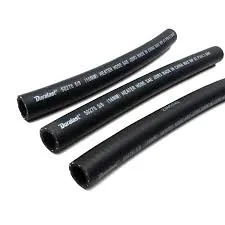Hydraulic Hoses Designed Specifically for Reliable Fuel Line Applications
Oct . 19, 2024 10:02 Back to list
Hydraulic Hoses Designed Specifically for Reliable Fuel Line Applications
Hydraulic Hoses for Fuel Lines An Essential Component in Modern Engineering
Hydraulic hoses play a pivotal role in various industries, especially in the automotive and aerospace sectors, where they are used to transport fluids under pressure. Among the many applications of hydraulic hoses, their use in fuel lines is particularly critical. This article explores the significance of hydraulic hoses in fuel systems, their construction, advantages, and the factors to consider when selecting the appropriate hose.
Understanding Hydraulic Hoses
Hydraulic hoses are flexible tubes designed to convey hydraulic fluids, including fuel, from one part of a system to another. They are composed of multiple layers, with an inner tube that transports the fluid, a reinforcement layer that provides strength and pressure resistance, and an outer cover that protects against environmental factors. The choice of materials and construction methods is crucial, especially for applications involving fuel, which can be corrosive and requires high durability.
Importance in Fuel Lines
Fuel lines are critical for the efficient operation of engines. Hydraulic hoses used in these lines must withstand high pressures, temperatures, and chemical exposure. For instance, in automotive applications, the fuel system must manage oscillations in pressure and temperature due to varying engine loads and ambient conditions. The reliability of hydraulic hoses directly affects engine performance, fuel efficiency, and emissions. Therefore, using high-quality hoses that meet industry standards is essential for ensuring safety and operational integrity.
Advantages of Hydraulic Hoses
1. Flexibility Hydraulic hoses offer a high degree of flexibility, allowing for easier installation and routing in complex systems. This is especially important in automotive designs, where space is often limited.
hydraulic hose for fuel line

2. Durability Constructed from high-strength materials, hydraulic hoses are designed to withstand the rigors of high-pressure environments, including vibrations and potential abrasion.
3. Resistance to Chemicals Hydraulic hoses used in fuel lines are specifically designed to resist degradation from fuels and other automotive fluids, ensuring longer service life and reliability.
4. Leak Prevention High-quality hydraulic hoses are engineered to minimize the risk of leaks, which is crucial for safety and environmental protection. Properly fitted hoses reduce the likelihood of fuel spills, which can be hazardous.
Key Considerations for Selection
When selecting hydraulic hoses for fuel lines, several factors should be considered
- Pressure Rating Ensure the hose can handle the maximum pressure it will encounter. - Temperature Range The hose material must withstand the temperature variations in the fuel system. - Compatibility Select hoses that are chemically compatible with the specific fuels used in the system. - Certification Opt for hoses that meet industry standards and regulations to guarantee safety and performance.
In conclusion, hydraulic hoses are an indispensable element of fuel line systems, enhancing performance and safety in a variety of applications. As technology evolves, ongoing improvements in materials and designs continue to enhance the reliability and efficiency of hydraulic hoses, making them essential in modern engineering solutions. Understanding their importance and selecting the right type is vital for anyone involved in system design and maintenance.
